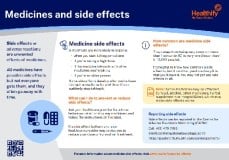If you're a frequent visitor to Healthify, why not share our site with a friend? Don't forget you can also browse Healthify without using your phone data.
Nortriptyline for chronic pain
Sounds like 'nor-TRIP-ti-leen'
Key points about nortriptyline for chronic pain
- Nortriptyline is used to treat ongoing (chronic) pain including nerve pain.
- Find out how to take it safely and possible side effects.

Nortriptyline is used to treat ongoing (chronic) pain, especially nerve pain such as burning, shooting or stabbing pain. These symptoms can keep you awake at night. Nortriptyline alters the way the nerves transmit pain messages to the brain. It can also help with sleep and relaxation. Read more about chronic pain and pain relief medicines for chronic pain.
Note: Nortriptyline is also used to treat depression and to help quit smoking. This page focuses on its use for chronic pain.
Brand change
From 1 August 2025, the funded brand of nortriptyline tablets (10 mg and 25 mg) has changed from Norpress to Allegron. The supplier of Norpress tablets has discontinued their supply to Aotearoa New Zealand.
Allegron tablets have the same active ingredient, in the same amount as Norpress tablets, and are designed to work in the same way. However, the new tablets and packaging look different.
For more information about this change, including images of the tablets, see Norpress brand change(external link).
If you have any questions about this brand change, talk to your healthcare provider. Remember, it’s important to keep taking nortriptyline because stopping suddenly can make you feel unwell.
In Aotearoa New Zealand nortriptyline is available as tablets (10 mg and 25 mg).
- Always take your nortriptyline exactly as your healthcare provider has told you. The pharmacy label on your medicine will tell you how much nortriptyline to take, how often to take it, and any special instructions.
- The usual dose to treat nerve pain in adults is 10 mg a day. This can be increased if necessary. The maximum dose of nortriptyline for treating pain is 75 mg a day, but this amount is only prescribed under the supervision of a pain specialist.
- Swallow the tablets whole with a glass of water: Don't crush or chew the tablets.
- Timing: You can take nortriptyline with or without food. It's best to take nortriptyline in the evening. Start by taking it 1 hour before going to bed – if you find that you feel drowsy the next morning, try taking it earlier in the evening.
- Missed dose: If you forget to take your dose, take it as soon as you remember. But if it's nearly time for your next dose, just take the next dose at the right time. If you only take one dose at bedtime and you miss the dose, don't take the medicine in the morning. Wait until the next night and skip the missed dose.
- Keep taking nortriptyline regularly: Nortriptyline doesn’t start working immediately. It can take a few weeks before the medicine is effective for some people. If it helps your pain, you can take it for as long as you need to, but don’t take any more than the amount prescribed without talking to your healthcare provider first.
- Don't stop taking nortriptyline suddenly: If you think nortriptyline is not working for you, speak to your healthcare provider. Don't stop taking the tablets suddenly. It should be gradually reduced over a few weeks to avoid severe side effects.
Here are some things to know when you're taking nortriptyline. Other things may be important as well, so ask your healthcare provider what you should know about.
- Nortriptyline may affect your ability to drive: Nortriptyline can affect your concentration (how you focus or pay attention). It can slow your reaction times and cause sleepiness, blurred vision, dizziness, or make you feel anxious or jittery. Be careful when driving or using tools until you know how this medicine affects you.
- Avoid alcohol while you're taking nortriptyline: Drinking alcohol can increase side effects of feeling sleepy, putting you at risk of falls and other accidents.
- Taking other medicines: Nortriptyline interacts with many other medicines, herbal supplements (such as St. John's Wort) and rongoā Māori so check with your healthcare provider before starting nortriptyline or before starting any new medicines or products.
Like all medicines, nortriptyline can cause side effects, although not everyone gets them. If you're concerned about any symptoms you think might be related to your medicine, talk to your healthcare provider. The following information offers some guidance but doesn't include all possible side effects.
Common side effects
- Dry mouth.
- Nausea (feeling sick).
- Headache.
- Constipation.
- Drowsiness.
- Light-headed.
- Blurred vision.
- Weight changes.
Tell your healthcare provider immediately or phone Healthline free on 0800 611 116 if these occur
- Fast beating heart (palpitations).
- Feeling anxious.
- Suicidal feelings or behaviour such as agitation, aggression, self-harm, worsening of low mood.
Read more about medicines and side effects and reporting a reaction you think might be a side effect.
The following links have more information on nortriptyline.
Nortriptyline(external link) NZ Formulary Patient Information, NZ
Norpress(external link) Medsafe Consumer Information, NZ
Allegron(external link) Medsafe Consumer Information, NZ
Brochures
5 questions to ask about your medications(external link) Health Quality and Safety Commission, NZ, 2019 English(external link), te reo Māori(external link)
Medicines and side effects [PDF, 91 KB] Healthify He Puna Waiora, NZ, 2024
References
- Nortriptyline(external link) NZ Formulary, NZ
- Helping patients cope with chronic non-malignant pain: it’s not about opioids(external link) BPAC, NZ 2014
Brochures

Medicines and side effects
Healthify He Puna Waiora, NZ, 2024

Health Quality and Safety Commission, NZ, 2019 English, te reo Māori
Credits: Sandra Ponen, Pharmacist, Healthify He Puna Waiora. Healthify is brought to you by Health Navigator Charitable Trust.
Reviewed by: Angela Lambie, Pharmacist, Auckland
Last reviewed:





